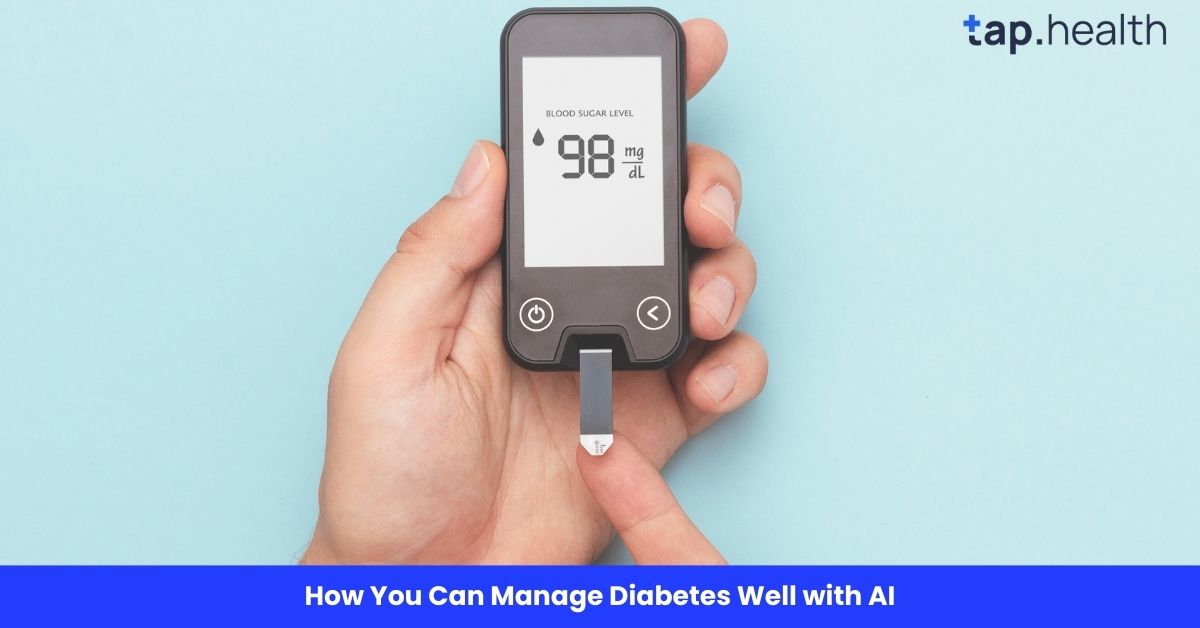Managing diabetes can feel overwhelming, but technology is here to help. One such helpful tool is AI, or artificial intelligence. AI is like a smart computer that can learn and help us in many ways. In this blog, we’ll explore how AI can make managing diabetes easier and more effective. We’ll keep it simple so everyone can understand, even if you’re in the 8th grade!
What is Diabetes
Before diving into AI, let’s understand diabetes a bit. Diabetes is a condition where your body has trouble handling sugar. This can lead to high blood sugar levels, which isn’t good for your health. There are two main types of diabetes:
- Type 1 Diabetes: This usually starts in childhood. The body doesn’t produce insulin, a hormone that helps control blood sugar.
- Type 2 Diabetes: This is more common in adults. The body either doesn’t produce enough insulin or doesn’t use it properly.
Managing diabetes involves keeping blood sugar levels in check. This often means monitoring your diet, exercising, and sometimes taking medication or insulin.
How You Can Manage Diabetes Well with AI
AI can be like a personal assistant for managing your diabetes. Here’s how:
1. Monitoring Blood Sugar
AI can help you track your blood sugar levels. There are smart devices that use sensors to read your blood sugar without the need for constant finger pricks. These devices can connect to your smartphone and use AI to predict trends, helping you understand how different foods and activities affect your blood sugar.
2. Personalized Meal Plans
Eating the right food is crucial for managing diabetes. AI can help create personalized meal plans based on your preferences, dietary needs, and blood sugar levels. There are apps that suggest meals and even grocery lists, making it easier to eat healthily.
3. Exercise Guidance
Regular exercise helps manage diabetes by lowering blood sugar levels. AI-powered fitness apps can suggest exercises tailored to your needs. They can track your progress and adjust your workout plans as your fitness improves.
4. Medication Management
Taking medication on time is important for keeping diabetes under control. AI can remind you when it’s time to take your medicine and track your medication schedule, ensuring you never miss a dose.
5. Predicting Blood Sugar Changes
AI can analyze your past blood sugar readings to predict future changes. This means you can be alerted if your blood sugar is likely to go too high or too low, allowing you to take action before it happens.
Benefits of Using AI
AI offers several benefits for people with diabetes:
- Convenience: AI tools are easy to use and fit into your daily routine.
- Accuracy: AI can analyze large amounts of data quickly and accurately.
- Personalization: AI provides personalized recommendations, making it easier to follow diabetes management plans.
- Peace of Mind: Knowing that AI is constantly monitoring your health can bring peace of mind.
Tips for Using AI in Diabetes Management
Here are some simple tips to get the most out of AI tools:
- Choose the Right Tools: Look for AI apps and devices that are designed specifically for diabetes management. Check reviews and consult with your healthcare provider.
- Consistent Monitoring: Use AI tools regularly to track your progress. Consistency is key to understanding and managing your condition.
- Stay Informed: Keep learning about new AI technologies and how they can help you. Technology is always evolving, offering new ways to improve your health.
- Work With Your Healthcare Team: Share the data from your AI tools with your doctor. This can help them understand your condition better and provide more personalized care.
Overcoming Challenges
While AI offers many advantages, it’s important to be aware of potential challenges:
- Privacy Concerns: Make sure the apps and devices you use prioritize your privacy and data security.
- Technical Issues: Sometimes technology might not work perfectly. Have a backup plan, like a paper logbook, just in case.
- Cost: Some AI tools can be expensive. Look for options that fit your budget, and check if your insurance covers any of these tools.
Read this : Bridging the Gap: Better Diabetes Care for Patients with Communication Challenges
FAQ: Managing Diabetes with AI
1.What is AI, and how does it help in managing diabetes?
AI, or artificial intelligence, refers to computer systems that can perform tasks needing human-like intelligence, such as analyzing data and making decisions. In diabetes management, AI helps by monitoring blood sugar levels, creating personalized meal plans, and predicting health trends to provide timely alerts and suggestions.
2.How does AI monitor blood sugar levels?
AI systems use data from continuous glucose monitors (CGMs) to track blood sugar levels throughout the day. They learn your body’s patterns and can send alerts if your levels are too high or low. This helps in taking preventive actions before any issues arise.
3.Can AI help me plan my meals?
Yes, AI can analyze your dietary needs and preferences to suggest meal plans that support balanced blood sugar levels. Some AI apps even suggest recipes based on the ingredients you have at home, making meal planning stress-free.
4.How does AI predict health trends?
AI analyzes data from various sources like CGMs, fitness trackers, and smartphones to identify patterns and trends. If it detects risky trends, such as consistently high blood sugar at certain times, it can suggest changes to your routine or diet to help manage your diabetes better.
5.Is using AI for diabetes management effective?
Yes, AI offers precise data analysis and personalized advice, making diabetes management more accurate and tailored to individual needs. It helps in maintaining consistent blood sugar levels and reduces complications by providing timely interventions.
How Tap Health Helps in Managing Diabetes?
Tap Health is an AI-powered mobile app that helps people manage diabetes by tracking blood sugar, HbA1c, meals, weight, and daily habits. It provides easy-to-understand insights into glucose patterns, sends reminders for medications and routines, and offers personalized meal plans and exercise guidance, including Indian regional foods. The premium version adapts to your health data, giving tailored advice, habit nudges, and motivational support. With multi-language support and an AI health assistant, Tap Health makes diabetes management simpler, more consistent, and affordable, while keeping your data secure.

References
- American Diabetes Association: “Artificial Intelligence and Diabetes Management.” American Diabetes Association
Provides insights into the role of AI in diabetes care and management. - National Institute of Diabetes and Digestive and Kidney Diseases: “Continuous Glucose Monitoring.” NIDDK
Information on the use of continuous glucose monitors, including AI-driven devices.



